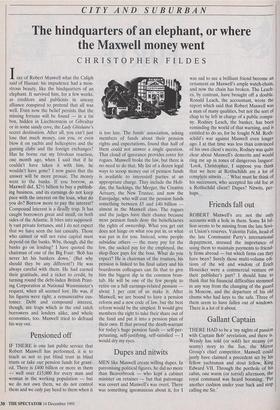Pensioned off
IF THERE is one last public service that Robert Maxwell has performed, it is to teach us not to put blind trust in blind trusts or take our pension funds for grant- ed. There is £400 billion or more in them — well over £15,000 for every man and woman in the working population — but we do not own them, we do not control them and we only pay heed to them when it is too late. The funds' association, asking members of funds about their pension rights and expectations, found that half of them could not answer a single question. That cloud of ignorance provides cover for rogues. Maxwell broke the law, but there is no need to do that. My list of a dozen legal ways to scoop money out of pension funds is available to interested parties at an appropriate charge. They include the Holi- day, the Sackings, the Merger, the Creative Actuary, the New Trustee, and now the Eurojudge, who will cost the pension funds something between £5 and £40 billion almost in the Maxwell class. The rogues and the judges have their chance because most pension funds deny the beneficiaries the rights of ownership. What you get out does not hinge on what you put in, or what was put in for you. Instead, some people subsidise others — the many pay for the few, the sacked pay for the employed, the shop-floor pays for the boss. What do you expect? He is chairman of the trustees, his pension is linked to his final salary and his boardroom colleagues can fix that to give him the biggest dip in the common bran- tub. He will be one of the few people to retire on a full earnings-related pension about 1 per cent of us make it. After Maxwell, we are bound to have a pension reform and a new code of law, but the best reform would be the simplest. It would give members the right to take their share out of the fund and put it into a pension plan of their own. If that proved the death-warrant for today's huge pension funds — self-per- petuating, self-justifying, self-satisfied — I would dry my eyes.


































































 Previous page
Previous page